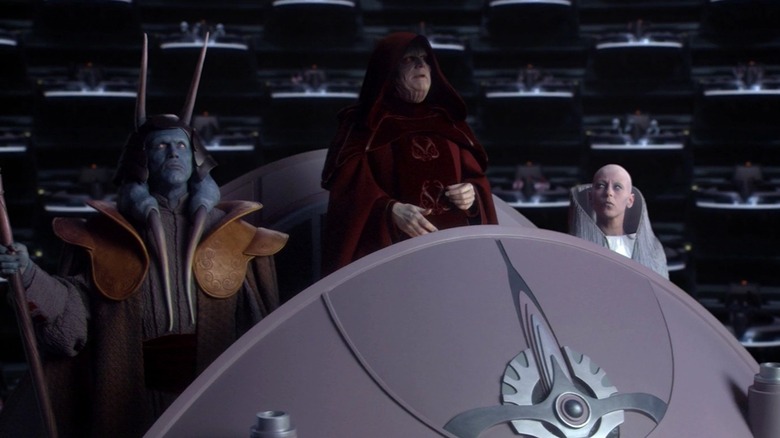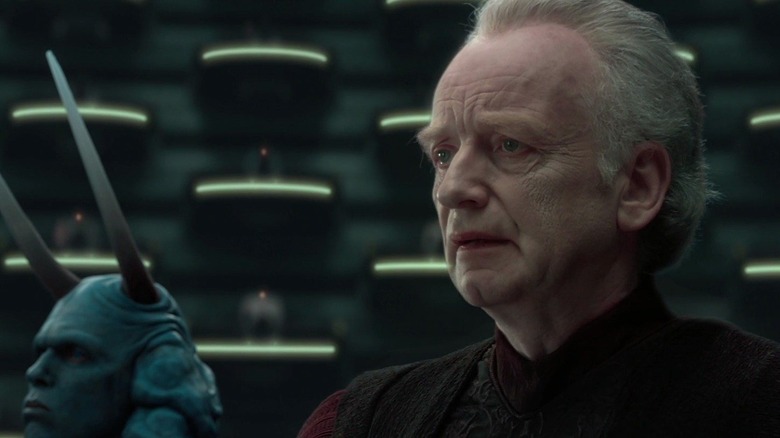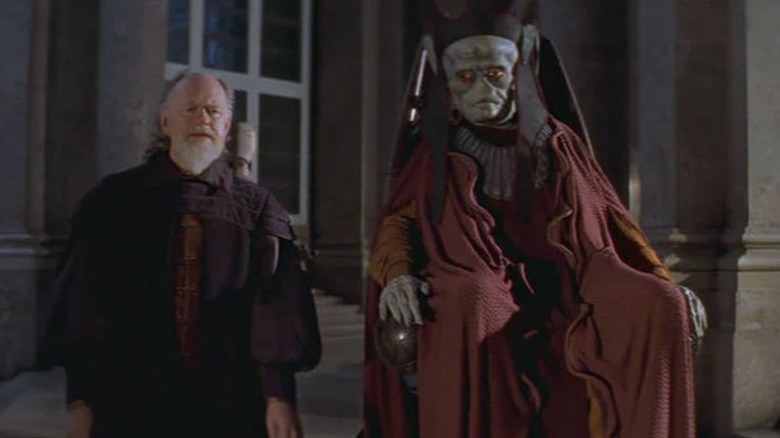George Lucas Had No Idea The Star Wars Prequels Would Be So Politically Prescient
One of the guests on "James Cameron's Story of Science Fiction" was George Lucas. In his conversation with the program's host, the creator of "Star Wars" said he feels there are two varieties of sci-fi: science-focused and social-focused. "I come out of anthropology, so my focus is social systems," Lucas explained.
A lifelong lefty, Lucas' politics guide his work. In that aforementioned interview, Lucas confirmed to Cameron that part of his inspiration for "Star Wars" was the Vietnam War — the Rebel Alliance is the Viet Cong and the Galactic Empire is America. In 2005, during the release of "Revenge of the Sith," he summed up the story of the "Star Wars" prequels in an interview with the Chicago Tribune: "Democracies aren't overthrown; they're given away."
During "The Phantom Menace," Palpatine/Darth Sidious (Ian McDiarmid) orchestrates his rise from Senator to Chancellor. In "Attack of the Clones," when his term limit is approaching, he creates war to give himself emergency powers and remain in office. When his power is consolidated in "Revenge of the Sith," he finally turns the Republic he falsely claimed to love into an Empire. This culminates with the best piece of dialogue Lucas has ever written, delivered by Senator Padmé Amidala (Natalie Portman): "So this is how liberty dies — with thunderous applause."
Lucas thought he was drawing on history when he wrote Palpatine's rise — he name-checked Julius Caesar, Napoleon, and Hitler as dictators who came to power with public support. Little did he know that his films would reflect the American zeitgeist they were released into.
Palpatine is Dick Cheney
During the early 2000s, America was still reeling from the 9/11 attacks. This unease is how the Bush administration was able to consolidate power, from creating the modern surveillance state with the Patriot Act or leading an invasion of Iraq with lies and deception. The narrative in the "Star Wars" prequels, of the galaxy giving up its freedom in the name of security, thus struck a chord.
In the aforementioned Chicago Tribune piece, Lucas and his producer Rick McCollum commented on the real-life parallels — and confirmed they were unintentional. McCollum said:
"First of all we never thought of Bush ever becoming president, or then 9/11, the Patriot Act, war, weapons of mass destruction. Then suddenly you realize, 'Oh, my God, there's something happening that looks like we're almost prescient.' And then we thought, `Well, yeah, but he'll never make it to the second term, so we'll look like we just made some wacky political parody of a guy that everybody's forgotten.'"
Obviously, that prediction turned out untrue — "Revenge of the Sith" wound up premiering during the first year of Bush's second term as president. While the former president didn't declare democracy over to the Senate, his handling of crises like Hurricane Katrina, the continued occupation of Iraq, and the 2008 financial crisis meant his term was no less disastrous for America than Palpatine's was for the galaxy.
Intentional parallels
That's not to say all the politics in "Star Wars" were accidental though. Going back to the original trilogy, there was a US president who Lucas used as a reference for Palpatine: Richard Nixon.
Read the novelization of the original "Star Wars" and you get a glimpse of how Lucas first conceived of the Emperor: a two-faced politician controlled by bureaucrats and the military-industrial complex. In other words, how the liberals of Lucas' generation saw Nixon — and how right they were. This change in Palpatine's character from figurehead to Sith Lord happened fairly early; "The Empire Strikes Back" established the Emperor as a Sith master whose power dwarfed even Darth Vader's. However, the broad strokes of democracy being eroded thanks to a strong man leader remained until Lucas eventually told that story in the Prequel trilogy.
Speaking of, "The Phantom Menace" alludes to the politics of the late 1990s. The opening text crawl declaring, "the taxation of trade routes to outlying star systems is in dispute," has been maligned as too boring a hook for a "Star Wars" movie. However, the 1990s were the dawn of the modern, globalized economy, making "The Phantom Menace" more pressing than it might first appear. Additionally, the head of the antagonistic Trade Federation is named Nute Gunray; that moniker is believed to be a parody of Newt Gingrich, then the Republican Speaker of the House.
The political streak of the "Star Wars" prequels is one reason they have drawn reappraisals. As for me, I think they're still too hampered by filmmaking and storytelling flaws to be great. However, the political commentary is further proof that regardless of execution, Lucas has never lacked good ideas.


